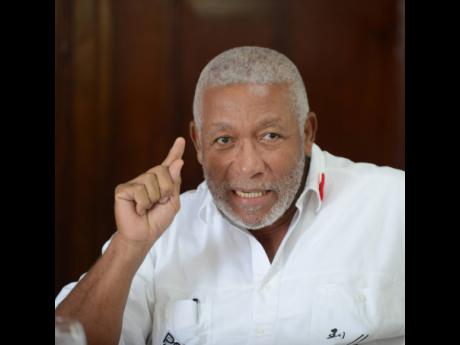Blame MPs, senators - Former JCF bosses say failure to update laws hamstrings policing efforts
Three former members of the Police High Command have placed the failure of the Jamaican State to properly police and punish criminals in the last 40 years squarely at the feet of past and current legislators in the Lower and Upper Houses of Parliament.
Speaking during a Gleaner Editors’ Forum last week, former police commissioners Owen Ellington and Hardley Lewin as well as former Deputy Commissioner Novelette Grant have suggested that the piecemeal approach to crime-fighting has not done Jamaica any good, and that the resulting haemorrhaging of lives is evidence of that failure.
The failure of the State to update and enact laws on a timely basis to match punishment with the metamorphosing crimes has made the job of the members of the Jamaica Constabulary Force (JCF) harder in the last 40 years, they contend.
Ellington said the country’s crime and violence problem was deeply cultural as the Jamaican society has little respect for law and order.
“Jamaicans have taken their offending culture overseas and are disproportionately represented in prisons in the United States, the United Kingdom and Canada. Those metropolitan societies have found a way to deal with criminal offenders from Jamaica through problem shifting. They deport them back to us,” Ellington said.
Among those deported are those midway and at the back end of serving their sentences.
But for Ellington, those countries have done what Jamaica has not.
“They have law reforms. They have brought their legislation in line so there is consistency across the board in terms of how violent criminals are treated in different jurisdictions. We have not done that. We have laws on the books that are more than 100 years old to deal with criminals who are using the Internet, cell phones, fast cars and with easy access to guns and ammunition,” he added.
LOW IMPACT ON CRIME
That approach, he charged, “will not impact the country’s crime problem, unless we are prepared to bring the laws in line with what obtains in other countries”.
Citing the Road Traffic Act, he said nearly 20 years ago, while he was in charge of the Police Traffic Division, he helped to write provisions for the new act passed by Parliament in 2018.
“Is it yet enacted?” he asked rhetorically.
Jamaica is still using the 80-year-old act, as the regulations to give life to the new act are not yet in place. The last update was that the regulations were with the Office of the Chief Parliamentary Counsel.
But the former commissioner did not stop there.
“Convicted sex offenders are being deported to Jamaica but cannot go on Jamaica’s Sex Offenders Registry. The argument is that they haven’t committed any crime in Jamaica. When I was in the JCF, I used to receive calls from the foreign countries telling me about persons on cruise ships that will be docking in Jamaican ports and who are registered sex offenders. They are reaching beyond the boundaries of their own jurisdictions, trying to give us information to protect our own citizens, and we are unwilling to do what is necessary,” Ellington charged.
According to him, the process of helping ourselves does not require major surgery.
“It’s not rocket science. It’s not hard to do. It just needs the political will to do what works elsewhere and to take the burden off the police. They are overworked and burnt out,” said Ellington, who retired as commissioner in 2014.
The collective failure, he said, has not kept Jamaica safe.
Notable laws and agreements enacted in the last 40 years include legislation providing for the extradition of criminals, the Access to Information Act, the Shiprider Agreement, and the Incest (Punishment) Act. There have also been laws addressing domestic violence, scamming, gangs, as well as the Major Organised Crime Act and Proceeds of Crime Act.
NO PROGRESS
However, for years, Director of Public Prosecutions Paula Llewellyn has been calling for legislation to allow the Crown to appeal judgments. Despite promises over several years, no progress has been made on this front.
Reference was made of priority laws such as those for the financial sector and the National Identification and Registration Act, which was deemed null and void by the courts and has returned to Parliament with amendments.
Grant recalled that 40 years ago, when she served as an investigator, there were offences still on the books which were laughable in court.
“You are just wasting the court’s time with fines that came over from pound, shilling and pence days and just translated into dollars. As the economic shift happened with the devaluation of the currency, those fines became laughable. The reality of it is that there has been a serious lag in how we look at the provisions put in place to deal with offences,” she told the forum, pointing out the importance of the courts.
“That is where you enforce the law by saying you acted this way or you failed to act this way and here are the consequences, and I am going to impose the law. But if the criminal legal system is not as robust as it should be, then there is another problem. As a former investigator, I was frustrated with sentences that were available. Some of them still exist,” she explained.
Since 2017, the justice minister has been promising to have hundreds of laws with outdated penalties and fines updated.
Turning to the legal reform programme, Grant questioned its capacity, pointing to the gap between the offences and punishments.
“The legislators just need to step up to that but I know that current investigators will tell you of their frustrations,” she stated.
According to her, the whole process should be given proper thought and there should be no expectation of a knee-jerk reaction given the steep climb in some crimes, especially murders.
“We keep talking about a justice system, but the question is how do we as a country get it to operate as a system. All the moving pieces have to be in sync – ... the physical facilities of good prisons, programmes of correction and rehabilitation, the robust law enforcement so that citizens ... actually know what it means to commit a crime,” she stated.
The public narrative must be maintained for policymakers to understand how each part affects the whole, she said, adding that fingers are quickly pointed at the police force for adverse recommendations.
For Rear Admiral Hardley Lewin, the persons involved in legal reform must do their jobs, but the common cry is of overwork and insufficient resources. He said it should not take a crisis to raise the issue of outdated laws.
Pointing to the Gun Court Act, he said that within two weeks, it moved from concept to law.
He said the process of drafting new laws was “a most torturous experience”, while in other jurisdictions, any lawyer could make such a draft and it was interrogated by the reform team.
“We have to go through the small bottleneck. In a day when the International Monetary Fund wanted things done, they dropped everybody’s work. So that’s part of the problem,” he stated.
Several current and former parliamentarians contacted by The Sunday Gleaner declined to comment on the issues.


